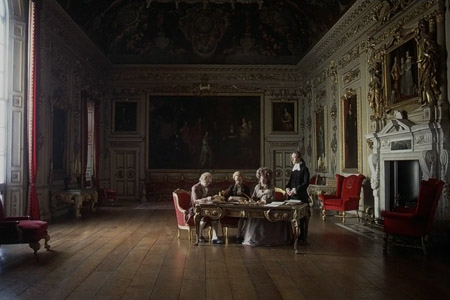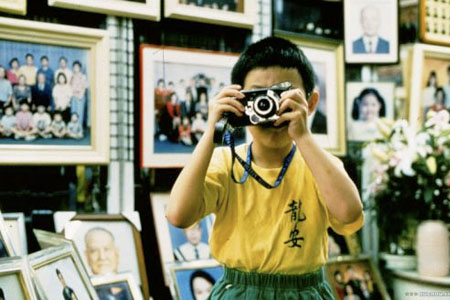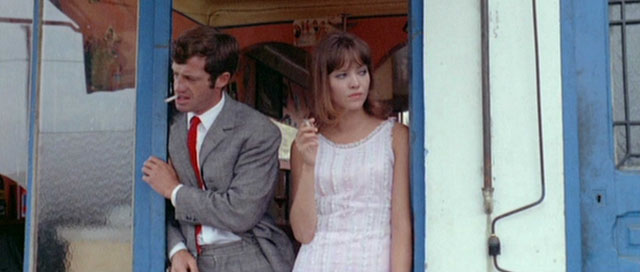
There are still a few small kinks to be ironed out of the online presentation, but the complete results of Sight & Sound‘s once-every-ten-years poll of critics can now be explored all but endlessly. Click on a single ballot—I’ll humbly propose mine as an example—and you’ll find that each of the ten titles is clickable, leading you to the names of the critics (or programmers, distributors, and other cinephiles with as yet undefinable occupations, such as my own) who voted for that title. Click on a name… and so on. 846 ballots and 2,045 films. Have a great weekend.
This entry picks up from the first on the magazine’s two polls (the other, of course, being the directors’ poll), so all relevant updates will be appearing here for the time being.
And we can begin with a marvelously annotated list from none other than Guy Maddin, posted just yesterday by Kim Morgan: “Discussing each movie with me (his official write-ups will be at S&S) and pleased to include his honorable mentions (all twenty of them) here’s his terrific, toiled-over tally.”
One more quick note for now: Beginning with a preview on Saturday (Vertigo, naturally) and picking up in earnest on September 1, BFI Southbank will be screening the critics’ top ten through October 9. Lucky Londoners, here‘s your schedule.
Updates, 8/17: “What Was in the Bowl?” Linking to his top ten, Ignatiy Vishnevetsky lists several hundred (okay, several dozen) other contenders.
Thomas Beard‘s stuck a fantastic clip to a pointer to his ballot.
Criticwire‘s Matt Singer lists a few “Movies That (Shockingly) Received At Least One Vote”: “[W]hile I call these votes ‘crazy’ I say that with love.”
The Playlist has “broken down the numbers” and discovered that, with seven films in the top 250, Robert Bresson has received more votes than any other director. Then come the names with six, five, and four films on the list; the decades are ranked (out on top: the 1960s); and then you’ve got a few more stats: docs and animation, the youngest and oldest living directors, and so on. Also: “30 Essential Films Missing from the Sight & Sound Top 100.”
In a similar vein, Brian Clark at Twitch: “10 Disagreements with the Sight & Sound Poll’s 250 Greatest Films List.”
Criterion posts entries (with clips) on Wong Kar-wai‘s In the Mood for Love (2000) and Bresson’s Au hasard Balthazar (1966).
Updates, 8/20: Jim Emerson does some heavy-duty parsing of the top 250, commenting on the stats he comes up with along the way (“The movies in the S&S Top Ten are still ahead of their time, their innovations and formal experimentation still too radical for many of today’s audiences”) and wraps “with my own 25 Favorite Movies That Nobody Voted for in the 2012 Sight & Sound Critics Poll—and I’d be perfectly happy if any ten of these great movies were to be substituted for the entire ballot I actually submitted.”
Adam Cook posts his “imaginary” ballot.
Updates, 8/23: And the poll of 358 directors is live. Sight & Sound has listed the top 100, while the directors’ individual ballots have been collated in with all the rest. So you’ll see, for example, that, because all voters, directors and critics alike, are listed alphabetically, director Aaron Katz is at the top of the heap and, more than 1000 ballots later, we land on Slovakian critic Zuzana Gindl-Tatarova‘s.
Kevin B. Lee notes that the Chinese language film website Cinephilia.net has also conducted a poll: “Sight & Sound polled 856 critics from around the world, whereas Cinephilia.net exclusively invited 135 critics who specialize in Chinese cinema. The two sets of results reveal significant differences between the tastes of Chinese and international film critics, particularly in regard to what they respectively consider to be the best Chinese films of all time.”
And then came Skuriels, another massive poll teaming critics who regularly for the Muriels and the Skandies.
The focus of Criterion‘s latest entry on its films in the S&S top 50 is Chantal Akerman’s Jeanne Dielman, 23, quai du Commerce, 1080 Bruxelles (1975).
Criticwire‘s Matt Singer: “We already held the critics’ feet to the fire over their craziest votes, so it’s only fair to do the same to the directors.” And he picks out a few favorites.
Updates, 8/26: Christoph Hochhäusler adds notes on each of his ten; and Ray Young draws up a ballot.
Thom Anderson for S&S: “I like to quote Wim Wenders’s statement at the beginning of Tokyo-Ga: ‘If in our century, something sacred still existed, if there were something like a sacred treasure of the cinema, then for me that would have to be the work of the Japanese director Yasujirô Ozu… For me never before and never again since has the cinema been so close to its essence and its purpose: to present an image of man in our century, a usable, true and valid image in which he not only recognizes himself, but from which, above all, he may learn about himself.’ What can I add? What seems like hyperbole is actually true. Perhaps I can supply the arguments Wenders didn’t feel were necessary.”
Criterion presents “a clip of an interview with Akerman (from our DVD edition of Jeanne Dielman, also a film in the poll’s top fifty), in which she talks about her experience of watching Pierrot le fou for the first time.”
“All it takes to correct the poll, to correct cinephilia as a whole, is a willingness to operate from a place of absolute personal honesty,” argues Jason Bellamy. “Too many cinephiles that I know feel passionately about too many recent movies, funny movies and completely accessible movies to make me think that the Sight & Sound list is the best reflection of which movies cause even the nerdiest of film nerds to exclaim, ‘This is fucking great!’ And if I’m wrong about that, we cinephiles have only ourselves to blame, because then it’s clear we’re spending far too much time talking about all the wrong movies.”
Updates, 9/2: Chris Cagle prefaces his own list with a response to Girish Shambu‘s thoughts on canons: “I’m not sure that the sotto voce versions of the canon that film academics hold is all that different from the cinephile canon. We watch and teach Criterion films, too, and we follow the key film festival auteurs like Denis and Weerasethakul. To the extent that we’re engaged in film culture beyond our specialization (remember, I watch a lot of Hollywood films from the 1940s), we’re likely to be followers of film critical practice, not leaders in it.”
The Austin Chronicle‘s Marc Savlov posts a list tilted towards genre, with clips and notes for each title.
And Christopher Small‘s arranged a personal ten best.
Criterion‘s posted a paragraph on and a clip from Kenji Mizoguchi’s Ugetsu (1952).
For news and tips throughout the day every day, follow @KeyframeDaily on Twitter and/or the RSS feed. Get Keyframe Daily in your inbox by signing in at fandor.com/daily.






